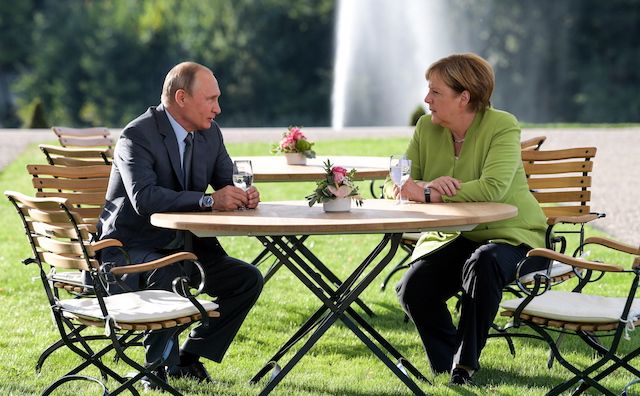The sense and nonsense of economic sanctions
Economic sanctions are occasionally useful in trade conflicts, but they work poorly when employed as a political tool. The United States and the EU would have accomplished more had they responded to Russia’s 2014 aggression against Ukraine with immediate increases in defense spending and kept their military options open.

In a nutshell
- The Western policy of sanctions against Russia has proven costly and ineffective
- The EU and U.S. lost the political confrontation with the Kremlin by their feeble response to Russian aggression in 2014
- Economic sanctions can be justified in trade conflicts
Russian President Vladimir Putin visited Germany to have a chat with Chancellor Angela Merkel recently. According to Kremlin spokesman Dmitry Peskov, no specific agreements were reached. The leaders’ purpose was to “check their watches” following a previous get-together in Sochi last May. The subjects raised during the latest meeting reportedly included the Ukraine conflict and the Minsk process, the Nord Stream gas pipeline from Russia to Germany through the Baltic Sea, and the situation in Syria and Iran.
In her opening statement, the chancellor invoked the two countries’ responsibility for world affairs – particularly Russia’s, as it is a permanent member of the United Nations Security Council. Mrs. Merkel also has made clear that the sanctions imposed on Russia will remain in place as long as the Minsk agreements, the internationally negotiated road map for resolving the conflict in Ukraine, are not adhered to by Russia and Ukraine is not permitted to reclaim full sovereignty over its territory.
Since 2014, the European Union and the United States have maintained economic sanctions against Russia. They were imposed in response to its annexation of Crimea and involvement in the ongoing war in east Ukraine.
Why Russia prevailed
Two geopolitical dogmas have clashed here. They are Ukraine’s right to determine its international associations (in this case, to join the EU’s Eastern Partnership), and Russia’s doctrine of protecting its national interests, and, especially, fending off foreign intrusion into its internal affairs by not allowing other powers (in this case, the EU and the U.S.) to establish a presence too close to its borders. In this particular case, their alarm was exacerbated by the fact that its main Black Sea naval base is in Crimea.
After four years of sanctions, the U.S. and the EU have not reached any of their goals in Ukraine. Russia, meanwhile, has consolidated its position in the region. The annexation of Crimea has become a fait accompli, contested only on paper, and Ukraine remains in limbo.
Moreover, the sanctions have lost much of their bite as Russia’s economy adapts to restrictions. Contrary to the expectations of many in the West, the country has managed to ramp up the domestic production of not only sanctioned goods but also find new suppliers of other goods.
The confrontation over Ukraine was lost by the West right at the start, in 2014, after Crimea was taken over by Russian forces. The West offered strong verbal support to Kiev, but then-U.S. President Barack Obama was quick to exclude any military action by his country (which de facto meant excluding any action by NATO) and weakened U.S. support for some economic measures. Furthermore, Mr. Obama belittled the conflict by describing Russia as merely a “regional power” – which has proven counterproductive by insulting the Kremlin.
Using the economy as a political weapon is always detrimental.
The response from the rest of Europe could only be described as feeble, consisting of verbal reassurances and conditional financial help.
As a result, the illegitimate seizure of Crimea by Russia succeeded.
Military aggression can only be stopped by a military deterrent – which these days includes cyberwarfare. In addition, proactive political steps would have worked better than the sanctions. An explicit declaration in 2014 by European countries, notably Germany, that they would increase their military budgets, combined with more active measures together with Washington, would have served the purpose better. Paradoxically, higher defense spending might have cost Europe less than sanctions in the end, since the latter do damage to both sides.
Experience clearly shows that government involvement in the economy does more harm than good. Additionally using the economy as a political weapon is always detrimental.
An exception to this rule is retaliation for unfair trade practices, as evident in the latest so-called trade war between the U.S. and China. Such conflicts, however, reflect purely economic competition and their implications are limited to trade.
